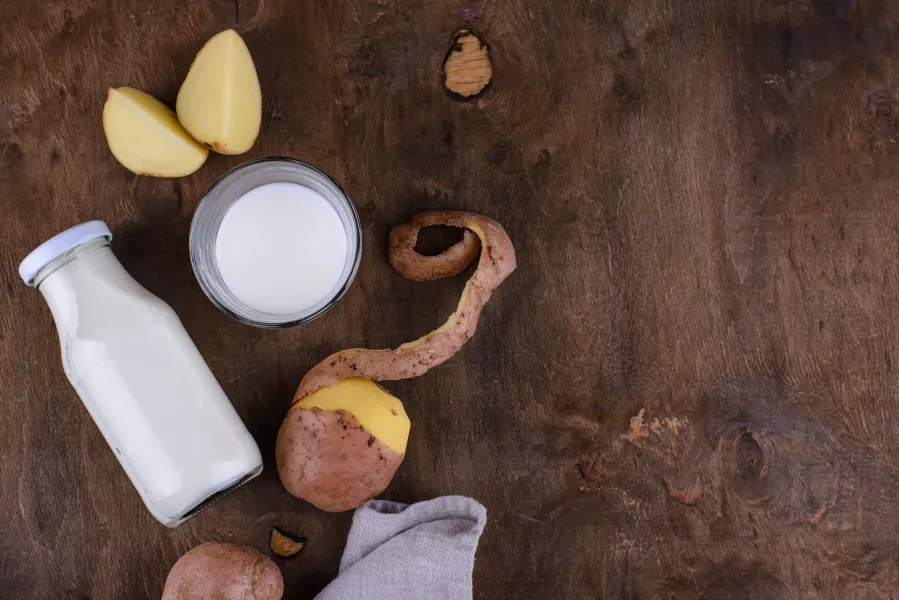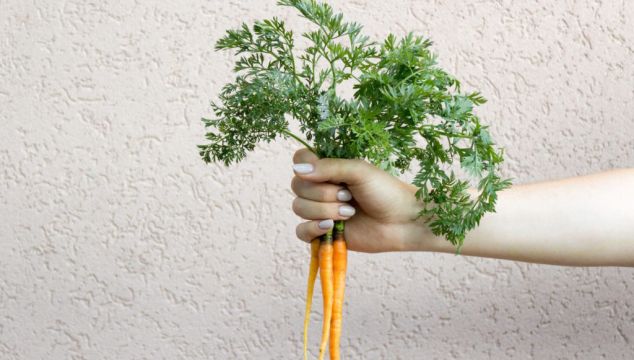While 2021 brought us air frying, pasta chips and takeaway cocktails, 2022 will be all about eating more sustainably and ordering from restaurants that aren’t really restaurants…
Whole vegetable cookery
There’s been a focus for a while on using as much of the animal as possible, including making bone broth and using cheeks and offal, but it’s common practice in most households to throw away vegetable peelings, stalks and stems.
As we all strive to be more sustainable in 2022 and beyond, there will be new encouragement to use the whole vegetable – including the green ends of leeks, carrot tops, kale ribs, beetroot greens and chard stems. Expect to see recipes proving the scraps usually destined for the bin make great additions to dishes.
Potato milk

Hailed as better for you and for the planet, milk from a potato is said to be the next big thing in alternative milks. Fortified with folic acid, vitamin D and calcium, it’s vegan, gluten-free and lactose-free, so suitable for pretty much every type of diet, and it even froths up nicely for cappuccinos. Waitrose predicts the milk will be huge in 2022 and will stock three varieties of Dug potato milk from the Swedish brand Veg of Lund from February.
Ghost kitchens
Not as spooky as they sound, ghost kitchens aren’t a completely new concept but the pandemic’s delivery service boom certainly has a lot to do with their growth. On food delivery apps you probably wouldn’t know they weren’t restaurants, but they’re actually kitchens solely set up for delivery, without a front-of-house operation or even shopfront you can even pick up food from.
Many are run from rented-out facilities – some even shared with multiple businesses – and with less overhead costs than a bricks-and-mortar restaurant and instant online traffic, they’re a great way for small businesses to get off the ground.
Croffles

Remember cronuts (croissant-doughnuts)? Well, next the weird-but-delicious hybrid is croffles: croissants in the shape of waffles. In what sounds like a glorious breakfast, you get the flaky pastry of croissants with the square dips to gather all the maple syrup you need. Like all the best viral food trends, the concept comes from South Korea but all you need is pre-made croissant dough and a waffle maker to create your own. Top with fresh berries, sugar, maple syrup, jam or Nutella.
Stricter cancellation policies
It’s been a rough couple of years for the hospitality industry and even now, in the post-vaccine era, restaurants are experiencing costly last-minute cancellations. In order to protect their business, it’s unsurprising that more and more restaurants will introduce stricter policies, which could mean handing over credit card details at the time of booking and a pricey ‘no show’ consequence for diners.
Beanless coffee
A major study published in Science by Joseph Poore and Thomas Nemecek in 2018 found that the production of coffee actually emitted more carbon emissions than poultry, pork or prawns (although much less than beef). So if you love your daily cup but want to be mindful of its impact on the planet, you could be drinking beanless coffee in 2022.
Already on sale in the US, the developers of Atomo Coffee say climate change and deforestation mean land that coffee beans can grow on is becoming more limited – a trend that will only continue. Their coffee is made with 98 per cent recycled ingredients including date pips and has the familiar caffeine hit.
Moringa

The superfood we might all be talking about this year could be Moringa – the Whole Foods Trend Council has hailed the ‘miracle tree’ as one to watch. Native to India but widely grown across Africa and Asia, many people believe it holds medicinal properties and is supposedly packed with impressive amounts of potassium, vitamin C, calcium, protein, iron and antioxidants. The easiest way to get hold of it is as a powered supplement to add to dishes and green smoothies.
Reducetarianism
Unlike vegans or vegetarians who eliminate meat and/or diary products from their diets entirely, a ‘reducetarian’ simply chooses to reduce the amount of animal products they consume – even if it’s by as little as 10 per cent. Whether it’s for health, environmental or animal welfare reasons, you could switch to meat-free Mondays, have vegetarian lunches during the week, or commit to learning a couple of vegan recipes a month. It all makes a real difference.







